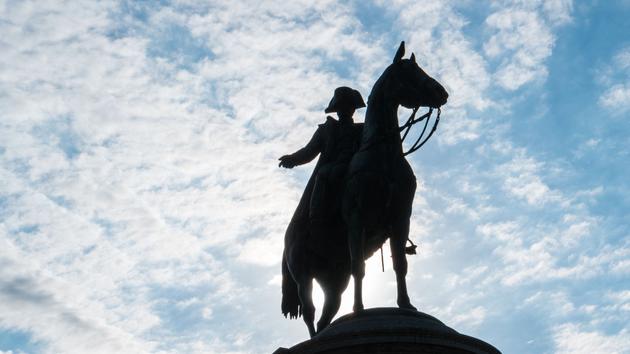Director of the Fondation Napoléon, Thierry Lentz is, with his master Jean Tulard, one of the greatest historians of Napoleon and his incredible adventure. He has published more than forty books on the subject, his last essay
Pour Napoléon
was published by Éditions Perrin.
FIGAROVOX.
- Your book is called "For Napoleon", is this a plea in his favor?
Thierry LENTZ.
-
The title reflects my state of mind, but it is not a plea.
I decided to write it down after a meeting, while helping to organize a large exhibition to commemorate the bicentenary of Napoleon's death, when an official in the assembly raised his hand to say that 'we should talk about slavery, the status of women, tyranny, wars ... My blood has only turned, I replied:
"You only have to make an exhibition against Napoleon!"
This book is my answer to all those who would like to erase the Napoleonic heritage, by looking at it with a contemporary eye.
I have written 46 books on the Napoleonic era, often addressing the questions that contemporary sensibilities impose on us.
Today, I feel like I worked for nothing.
This book could have been called "For History", because even when it is tragic it is a wealth.
You don't have to keep your eye on what is bitter or narrow.
Napoleon trusted future generations to sort things out on his balance sheet and his posterity.
I hope with this book that we can put the historical debate in the right direction.
What do you think we owe Napoleon?
We owe Napoleon who we are.
Napoleon is
in us.
We certainly owe our institutions, numerous monuments, town planning rules, such as the alignment of houses or the numbering of streets, the baccalaureate, the Legion of Honor, the Academic Palms, the obligation to bury our dead. six feet underground and even a certain "pride" in being French.
But it goes even further.
Its Civil Code,
"the source of morals and the guarantee of public and particular peace",
to use the expression of Jean-Étienne Portalis.
Despite the necessary reforms, it remains the basis of our life as a citizen, with the rules of legal equality, civil and contractual freedom, respect for property, I would tend to say "now and at the time of our death ”, since the rules of succession still date from 1804.
He is often said to be the greatest warlord, but he is also the greatest man in the history of France.
To analyze and understand all this, it is obviously necessary to situate the context in which Napoleon emerges, after a thousand years of monarchical legitimacy, and while national sovereignty begins to appear.
Napoleon will adapt, deal with this present and a country which is in a critical situation.
This explains in particular that it stifles, largely but without the violence that it is sometimes criticized, political freedom.
However, let us recognize that there are situations which require action, after the Revolution, the excesses of the conventional regime and the impotence of the Directory, it is Napoleon who assumes this task.
He is often said to be the greatest warlord, but he is also the greatest man in the history of France.
Should we celebrate the bicentenary of the Emperor's death?
Due to the pandemic, the only celebrations that will take place will probably be those scheduled for May 5 at Napoleon's tomb in Saint Helena.
But the commemoration will take place.
It has even already started with a burst of publications, remote events and, from next week “Napoleonic” programming touching all the major television channels.
In addition, everything is ready for the opening of the major exhibitions planned.
The horizon of May 15 was given to us by President Macron.
If he has spoken the truth, we will be able, together and "in the flesh" to rush to the Invalides, La Villette or the National Archives where everything is already in place.
Many things are still scheduled for the fall, in France and abroad where the image of Napoleon is still very strong, including in countries that were once his enemies.
The Napoleon Foundation has recorded around 250 events throughout the year 2021.
I note once again that the bicentenary is an opportunity to abuse Napoleon by adding any adjective to it, as long as it is pejorative.
I note once again that the bicentenary is an opportunity to abuse Napoleon by adding any adjective to it, as long as it is pejorative.
In order not to frighten our contemporaries, the “Napoleon” exhibition at the Grande Halle de La Villette has provided a focus on “angry questions”, the one concerning the unfortunate decision of 1802 was even produced under the patronage of the Fondation pour la Villette. Memory of slavery.
Anyway, we are a little bewildered to note that far too many players in this debate hardly care to explain, their goal is simply to attack what makes us what we are, to replace minimal knowledge of history through their slogans.
Why do you fear its detractors so much?
In terms of historical knowledge, I am not afraid of them.
What I fear is that, out of weakness, not to say cowardice, we let them impose their ideas, their vision.
The active groups are in the minority in the country, but they are supported and defended by policies and by an ideology which claims to be “progressivism”.
When MM.
Amiel and Emelien, close to Emmanuel Macron, admit that they treat the past as a malleable object as they wish, selecting only what suits them, we understand that they “canceled” what does not suit their reading.
How can we believe that it will be possible for us to form society when the advisers of the President of the Republic neglect what makes French culture, its traditions and its history?
Mr. Macron announced that he would speak at the time of the bicentenary.
We wait, as much as we hope and fear, for his words.
It is to say if one has the feeling of not knowing any more on which foot to dance.
No doubt it is time to put things in their place, in order if I dare say so.
Otherwise, everything will happen as if the history of France had not taken place, as if the Revolution, the Consulate and then the Empire had been nothing but mirages seen for a century in school books and timelines, become hateful then erasable from our common past.
To overcome Napoleon would be to destroy what we are.
Napoleon is very practical for all these people, because it is a big part of the national history.
To overcome it would be to destroy who we are.
The stake therefore goes beyond this bicentenary.
While it is necessary to be able to debate history, we must not deny it, always sully it, be ashamed of it: it is now at stake for our national cohesion.
Everyone has understood that Napoleon is here only a cover-up of the indigenous agenda: to undo our past, our traditions and our beliefs to better replace them with their bitterness, their detestation of everything that is national, with a dose of victimhood competition and a reading of everything through the colonial past.
They are enraged to see that there is someone happy somewhere, happy to take pleasure in the study of history, happy to meet with others to “celebrate” it, happy and proud of it. 'being French.
We will have to arm ourselves with patience and composure, but not abandon the field to them either.
For us too, no doubt, the stake goes beyond the single person, immense and irreplaceable, of Napoleon.
It is about who we are and want to continue to be.











/cloudfront-eu-central-1.images.arcpublishing.com/prisa/KMEYMJKESBAZBE4MRBAM4TGHIQ.jpg)


/cloudfront-eu-central-1.images.arcpublishing.com/prisa/EXJQILQR5QI7OMVRTERD7AEZAU.jpg)
